Xi: Continuum’s Darkening Moral Universe
by SealWyf, HSM editor
Despite my pleas for a stronger story line, Day 14 was a shocker.
On the whole, I was grateful that the pace of Xi: Continuum was still slow, since it allowed me to compress eleven days of holiday absence into two days of intense play. And as I played, I started to see what nDreams might be up to by keeping the pace slow and deliberate.
What the slow unfolding of the story and minimal action gives us is immersion in the world itself. Since there is little to do each day, we are thrown back on our own imaginations — exploring the city and telling ourselves stories, creating our own inner role-plays in the intricate world we have been given.
After my initial frustration, I’m starting to see this as a brilliant and subtle move on nDreams’ part. If one is writing a game, the obvious course is to provide lots of gameplay to keep the players occupied. It takes real courage to ignore the demands for more action, set the game aside and instead create an immersive universe, trusting that the players will populate it with their own emotions. But the slow pace makes it all the more effective when you drop in a moral shocker.
The truly brilliant part is that many people will have played Xi: Continuum without seeing it.
On Day 14, Axiom, the increasingly morally ambiguous AI program who briefs you each day via Holomail, drops some disturbingly oblique hints about what is happening to the captured avatar of MerylSilvertongue. The letter is the only official content for Day 14, and it’s tempting to spend the rest of the day searching for Fragments or playing the card game in the Snow Crash bar, or simply moving on to other activities in Home. But, being a curious soul, I headed over to the Axiom HQ to take a look. What I found there took my breath away, and left me wondering what, exactly, nDreams’ writers are up to.
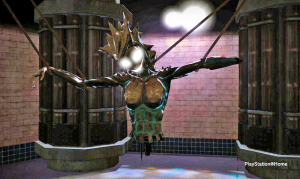 For those who missed it, what you find in the cynically euphemistic “Broom Cupboard” — Axiom HQ’s private interrogation chamber — is a scene of torture. The fragmentary remains of MerylSilvertongue, still pathetically twitching, hang in chains over a darkly-spattered drain. Her missing limbs are laid out on dissecting tables. The scene is bathed in the ironic glow of a cathedral window.
For those who missed it, what you find in the cynically euphemistic “Broom Cupboard” — Axiom HQ’s private interrogation chamber — is a scene of torture. The fragmentary remains of MerylSilvertongue, still pathetically twitching, hang in chains over a darkly-spattered drain. Her missing limbs are laid out on dissecting tables. The scene is bathed in the ironic glow of a cathedral window.
This is one of the most disturbing scenes I have ever encountered in a video game — and this despite having been assured that MerylSilvertongue was not a conscious being. She was not even a normal avatar, the real-time virtual interface of a human user. She was merely a construct, a simulacrum, pre-programmed with a vocabulary of responses — the computational equivalent of a wind-up doll. Nothing here to feel sorry for, folks. We can do what we want to her. Don’t fret about it.
But, facing this horror, it doesn’t matter. All the rationalization in the world can’t disguise the fact that something resembling a human being — something resembling a woman, for heaven’s sake — has been tortured and vivisected by the side we are supposed to be supporting. By us, the good guys. And we, the player, having interrogated the captive avatar in a previous episode, are fully complicit in her murder.
In one nerve-jolting moment, we were dropped from a sterile, somewhat boring universe into one populated by horror. We did this. This is the stuff of nightmares.
It’s also damn brilliant storytelling. As I stood before that appalling vision, my inner writer was slowly, deliberately, enviously applauding.
So, what does this mean for us as gamers, and as human beings? In the middle of what was supposed to be a game, nDreams has presented us with a moral challenge in the image of a computer construct, an avatar, that has been brutally murdered by the side we are supporting.
Why should this disturb us? After all, MerylSilvertongue was just a computer program. And this is just a game. So there are two layers of disconnect from actual moral reality. It’s amazing we feel anything at all.
But, by those standards, why should any depiction of violence in a game disturb us? Why are there some books we leave unread, some films unviewed, some thoughts mostly unexplored? Why should anything that happens entirely in our imaginations feel off-limits?
Many years ago, I read an article in the New York Times Review of Books about why people should be kind to animals. From an evolutionary point of view, it makes no sense to help anyone outside our immediate gene pool. Unrelated strangers and animals should not to be within the radius of caring.
But that’s not our intuition. In fact, as society evolves, the radius of caring expands. The history of the past few centuries can be seen as an expansion of the moral radius. Consider the state of human rights in the United States when its Constitution was framed, a bit over two centuries ago. Race-based slavery was accepted. Women could not vote. Contrast that to the present, where a man of color is a two-term President, and one of the next major party candidates may well be a woman. Capital punishment is declining, though not as fast as some would wish. Marriages between same-sex couples are increasingly accepted. And there is a growing acceptance of the moral rights of animals, which includes a striking rise in vegetarianism.
Many people feel these changes are foolish, or have gone too far, or too fast. And there are still large parts of the world that persist in the moral universe of the Middle Ages. But everyone will agree we have seen a remarkable amount of cultural change in nine generations — a change that can be summarized as the expansion of those we accept as “us”, the beings worthy of respect and protection.
Why should the moral radius expand as society evolves? What good does it do us, as rational beings, to feel empathy for anyone other than our immediate kin? The answer that the author of the NYTRB article proposed was that we are not kind to animals because of any benefit, immediate or evolutionary, they can offer us. But our kindness is still a selfish calculation — we are kind for selfish reasons, because to be cruel damages us. It harms our moral sense and self-esteem, and whatever it is we call our souls.
This is a powerful argument. And it makes intuitive, if not logical, sense. All of us who are not actually sociopaths have felt that certain actions or ideas leave us feeling damaged or polluted, even if no other being was affected by them. This is one of the most powerful arguments against pornography, and also against hyper-violent films and video games. Whether these things make us more likely to do evil in the real world is an ongoing debate, worthy of a separate article, though beyond the scope of this one. Setting real-world fallout aside, what we can say with certainty is that reading, viewing and experiencing certain kinds of content makes us, personally, feel damaged. And that is a valid reason to avoid them.
All of us carry within ourselves a secret store of images we wish we had not seen, texts we wish we had not read, and thoughts we wish we had not entertained. It lies close to that other closely-guarded chamber of memories — the words we wish we had not said, and acts we wish we could undo. These are the things that give our lives power and urgency, and our souls moral depth, at the cost of emotional scars and indelible real-world damage. This is the Dark Country beloved of writers. We cannot avoid it, and still be human. But each of us has to decide how far into it we dare intrude, how much we can learn from it, and how much we are willing to pay for the knowledge. Odin’s sacrifice of an eye, and Adam and Eve’s expulsion from the Garden are the mythic equivalents of that decision.
nDreams stepped right up to the edge of the Dark Country with the image of MerylSilvertongue’s mutilated body, and its moral implications. It stops us dead in our tracks. We did this. It’s an image that resonates with real world stories — among them, the problematic treatment of prisoners by American forces in Iraq, not that many years ago, and the fatal torture-rape of a young woman in New Delhi this past December. Xi: Continuum has made us complicit in this scene of violence. It leaves us wondering what sort of game we are playing, and what we are supposed to feel about it.
It also makes us ask whether we are on the wrong side in this admittedly fictitious conflict, and whether we might have other options. At present, the only possible act of protest is to stop playing. And this we are unlikely to do, because then the story would never be resolved. The drive to find out “what happens next” overpowers our moral revulsion. So we remind ourselves that this is just a story. But we also start to consider our alternatives.
Will we be given the chance to switch sides later? There are now apparently three other sides to which we might defect. At present, my sympathy lies with the Divine Zero group. They are fellow nerds and programmers. They created the Continuum, which gives them moral title to it. And the abuse of MerylSilvertongue lends them a powerful empathetic edge. But there is also the “Hole in the Firewall Gang”. I confess to feeling a strong attraction to their leader, EatFlamingDeath, not least because she is a powerful female character and obvious counterfoil to our own somewhat passive contact, Jess. Then there is the mysterious Blaise, “le Canadien”, who may or may not be allied with anyone else, and seems at present hell-bent on the total destruction of the virtual gamespace.
Or should we stick with Axiom, despite its occasional moral lapses? After all, can you expect an artificial intelligence to have a conscience? But this brings up the larger question of why Jess and the other human members of our group allow their moral choices to be made by a computer. Why have they abdicated their responsibility? And this, too, has resonances with our own, real-world condition.
These are the kinds of questions we ask ourselves as the game hits its halfway point. I am writing this after completing the gameplay of Day 24. We have just 23 days left, to make sense of this. But I doubt our questions will be fully answered. There’s enough material here for a full-length novel, and the Axiom’s laconic daily briefings won’t be able contain it. We will simply have to create the rest of the story from hints and implications — in our own minds, our own imaginations, and our own emotional reactions to Xi’s increasingly ambivalent moral universe.


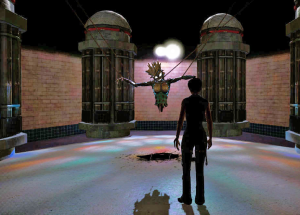
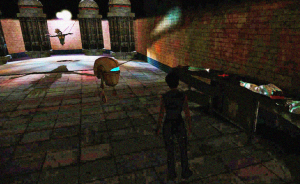
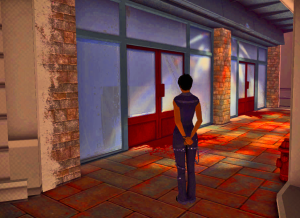


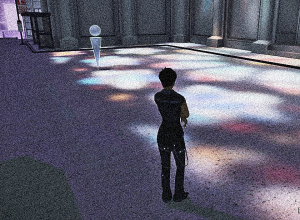
Very nice article Seal.
I wasn’t here for the first Xi, and sadly I couldn’t play this one. I have gleaned as much information from the articles on it however and they are enlightening.
Xi has a very interesting story line.
“But our kindness is still a selfish calculation — we are kind for selfish reasons, because to be cruel damages us.”
And because Middle Earth was saved because Bilbo (and Frodo) felt pity for Gollum.
Does MerylSilvertounge have feelings? Is there a real person behind MerylSilvertounge as there is behind HOME‘s avatars? Is there a human type character we can identify with in MerylSilvertounge?
I liked Robby the Robot and could identify with with it as an interesting character in the movie Forbidden Planet. Merylsilvertounge ain’t no Robby the Robot at least not to me. And Robby the Robot is not real. Created by a human true, but there is not a real person being it. So why do I like that non-human robot so much?
As for Xi and Xi 2, they’re stories, video games much like movies are. Can they take over the world and hurt us? I think not. It’s fiction much like
Colosuss:The Forbin Project <— YouTube trailer.
Or could computers rule us? Maybe, not yet though. That's in the future in things to come.
As to animals, they at one time helped early mankind evolve and have in the case of dogs and cats been adopted as pets. We even like dolphins I guess because they're mammals. So why do we race them in home? Because it's fun and it's a game and no one is hurt. I've heard no uproar from PETA on banning the dolphy races… so far anyway.
Maybe the answer to everything is that people care about each other and even other living things… and in the case of non-human, some real things or even make believe characters like Robby the Robot.
I don’t know what I’m talking about but I have fun doing it anyway.
Bye.
Great article Seal,
The writing in Xi: Continuum has been fantastic. They are making us question everything and many things have much larger meanings that what they seem.
One of my favorite things they have done well is the “story behind the story” is evolving ever so slowly. The brutal treatment of MST is a great example of that!
You pinned it Seal. For all the reasons you’ve stated and thoughts you’ve poured over in this article are the reasons Xi C is what it is. But the key word you’ve used in here too, is the reason so many people are not fully understanding Xi; Imagination.
The moral controversy the whole thing with Meryl kicks up could have easily taken us all on a tangent far off the beaten path, but Xi marches on after throwing these things at you.
PS, I wouldn’t side with those Zeros quite so fast. ; )
Yeah, the website chat of the Zeros is looking like stuff we’ve seen on the Forums. Looks like we’ll need to bring in Hiro Protagonist to sort this out. Or maybe Gandalf.